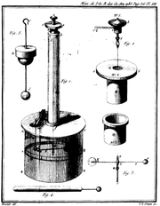
Electric charge
Overview
Physical property
A physical property is any property that is measurable whose value describes a physical system's state. The changes in the physical properties of a system can be used to describe its transformations ....
of matter
Matter
Matter is a general term for the substance of which all physical objects consist. Typically, matter includes atoms and other particles which have mass. A common way of defining matter is as anything that has mass and occupies volume...
that causes it to experience a force
Force
In physics, a force is any influence that causes an object to undergo a change in speed, a change in direction, or a change in shape. In other words, a force is that which can cause an object with mass to change its velocity , i.e., to accelerate, or which can cause a flexible object to deform...
when near other electrically charged matter. Electric charge comes in two types, called positive
Proton
The proton is a subatomic particle with the symbol or and a positive electric charge of 1 elementary charge. One or more protons are present in the nucleus of each atom, along with neutrons. The number of protons in each atom is its atomic number....
and negative
Electron
The electron is a subatomic particle with a negative elementary electric charge. It has no known components or substructure; in other words, it is generally thought to be an elementary particle. An electron has a mass that is approximately 1/1836 that of the proton...
. Two positively charged substances, or objects, experience a mutual repulsive force, as do two negatively charged objects. Positively charged objects and negatively charged objects experience an attractive force. The SI unit of electric charge is the coulomb (C), although in electrical engineering it is also common to use the ampere-hour
Ampere-hour
An ampere-hour or amp-hour is a unit of electric charge, with sub-units milliampere-hour and milliampere second...
(Ah).
Unanswered Questions

